 Petzlover
Petzlover Belgian Griffon is originated from Belgium but Broholmer is originated from Denmark. Belgian Griffon may grow 55 cm / 21 inches shorter than Broholmer. Belgian Griffon may weigh 74 kg / 163 pounds lesser than Broholmer. Belgian Griffon may live 3 years more than Broholmer. Belgian Griffon may have less litter size than Broholmer. Both Belgian Griffon and Broholmer requires Moderate Maintenance.
Belgian Griffon is originated from Belgium but Broholmer is originated from Denmark. Belgian Griffon may grow 55 cm / 21 inches shorter than Broholmer. Belgian Griffon may weigh 74 kg / 163 pounds lesser than Broholmer. Belgian Griffon may live 3 years more than Broholmer. Belgian Griffon may have less litter size than Broholmer. Both Belgian Griffon and Broholmer requires Moderate Maintenance.
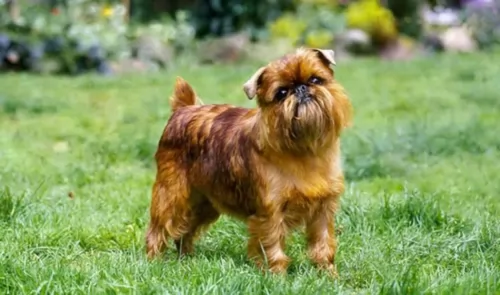 The Belgian Griffon isn’t your most attractive dog, but maybe its his quirky, gremlin looks that makes him such an adored pet for many. There are different varieties of Griffon, and the Belgian- and Brussels Griffon are one and the same. All small Belgian dogs have the same breed standards, with the Belgian having a rough coat The dog hails from Belguim and its ancestors were no doubt a mix of the Belgian street dog, the Stable Griffon and the Affenpinscher.
The Belgian Griffon isn’t your most attractive dog, but maybe its his quirky, gremlin looks that makes him such an adored pet for many. There are different varieties of Griffon, and the Belgian- and Brussels Griffon are one and the same. All small Belgian dogs have the same breed standards, with the Belgian having a rough coat The dog hails from Belguim and its ancestors were no doubt a mix of the Belgian street dog, the Stable Griffon and the Affenpinscher.
Later on in the 1800s, this combination was then crossed with the Pug, giving the dog the brachycephalic or flat faced look.
Unfortunately no written records were kept about the precise origin of this breed, but there is also the idea that the King Charles- and English Toy Spaniel were also involved in its development. These small dogs were bred to catch rats in the barns of European estates.
 This giant dog, the Broholmer, comes from Denmark and falls into the general Molosser type of Mastiff dog. The breed was originally developed by crossing the local German dogs with the English Mastiffs to create what is also known as a Danish Mastiff. The breed is named after an 18th century game-keeper names Sehested of Broholm. This type of dog has been present however since the Middle Ages in Europe. It started out as a stag hunting dog but quickly evolved into a guard dog. They were greatly favored by the wealthy and nobility, including being featured in portraits with King Frederick VII and Countess Danner.
This giant dog, the Broholmer, comes from Denmark and falls into the general Molosser type of Mastiff dog. The breed was originally developed by crossing the local German dogs with the English Mastiffs to create what is also known as a Danish Mastiff. The breed is named after an 18th century game-keeper names Sehested of Broholm. This type of dog has been present however since the Middle Ages in Europe. It started out as a stag hunting dog but quickly evolved into a guard dog. They were greatly favored by the wealthy and nobility, including being featured in portraits with King Frederick VII and Countess Danner.
Like many European dogs, the Broholmer, did not fare well during the second World War. During this time there was little purebred breeding and their numbers decreased almost to the point of extinction. Brought back by a group called “The Society for the Reconstruction of the Broholmer Breed”. With the support of the Danish Kennel Club, they were successful in bring the breed back. They were recognized by both the Federation Cynoloqique Internationale and the Danish Kennel Club. By 2009 they were being imported to the United Kingdom, hoping to get them onto the import lists of the United Kingdom kennel club (UKC).
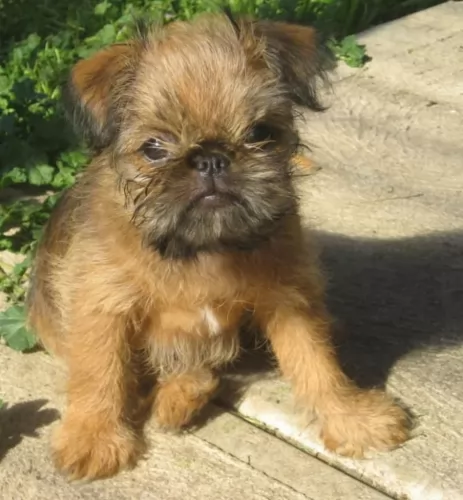 There are different variations of this dog to give it its distinctive look and size. This quaint looking little Griffon canine comes with two different coat types - soft or wiry. With the Belgian Griffon, his wiry coat of red, tan or black will need to be brushed at least twice a week. Shedding with this dog is seasonal.
There are different variations of this dog to give it its distinctive look and size. This quaint looking little Griffon canine comes with two different coat types - soft or wiry. With the Belgian Griffon, his wiry coat of red, tan or black will need to be brushed at least twice a week. Shedding with this dog is seasonal.
He has a compact, sturdy little body, and he trots around with attitude. With his sharp pointed ears and whiskers, he has been given the nickname ‘bearded dog’. His dark black eyes are alert. He is self-confident, intelligent and curious breed, a great family pet and good with children if he has grown up with them in the home. He is good with other pets. The fact that this is a small breed and that he doesn’t have excessive energy levels, means he is adaptable to city- and country living.
 The Broholmer is a very large dog with Mastiff qualities. He is strong, rectangular and powerful in build. He has a massive head and neck with a deep and broad chest. The length of the nose is the same as the length of the skull. He is tall, well built and his thing and hindquarters are powerful. His stance and gait are powerful and intimidating as well. His appearance and size alone account for his guard dog status. However, he is a little smaller than most Mastiffs and he is athletic looking as well.
The Broholmer is a very large dog with Mastiff qualities. He is strong, rectangular and powerful in build. He has a massive head and neck with a deep and broad chest. The length of the nose is the same as the length of the skull. He is tall, well built and his thing and hindquarters are powerful. His stance and gait are powerful and intimidating as well. His appearance and size alone account for his guard dog status. However, he is a little smaller than most Mastiffs and he is athletic looking as well.
The Broholmer is a double coated breed with a short topcoat and a thick undercoat. The color of the Broholmer is yellow or a golden red. Some have white on the feet, tail tip or chest and some have a black mask. Most do not have any mask.
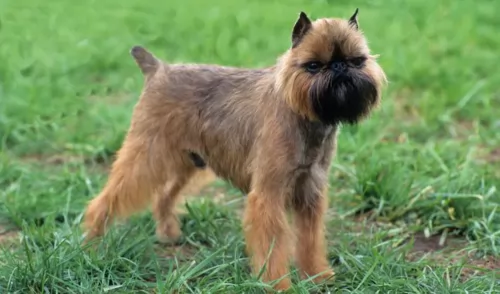 The Belgian Griffon is an affectionate pet and often establishes a strong bond with one member of the family. You’ll have your Griffon with you for about 15 years so make sure he is trained and a pleasure to have around.They are difficult to train, being somewhat stubborn so they are going to require patience. They’re sensitive too, and they won’t respond well to aggressive treatment.
The Belgian Griffon is an affectionate pet and often establishes a strong bond with one member of the family. You’ll have your Griffon with you for about 15 years so make sure he is trained and a pleasure to have around.They are difficult to train, being somewhat stubborn so they are going to require patience. They’re sensitive too, and they won’t respond well to aggressive treatment.
They’re much more indoor dogs than outdoor dogs because they’re also vulnerable to heat stroke. They just want to come indoors and be with their human family, and when you do that for them, they’ll become a wonderful friend and companion to you.
 The Broholmer is a calm, friendly dog. He is a large dog that thinks he is a lap dog. He wants to be close and snuggle with his people all the time. He is great with kids and other dogs. At the same time, he can be very watchful and protective. Because of this along with his size he needs a strong owner who is clearly the pack leader. He is wary and protective around strangers and can be stubborn if he thinks he is in charge.
The Broholmer is a calm, friendly dog. He is a large dog that thinks he is a lap dog. He wants to be close and snuggle with his people all the time. He is great with kids and other dogs. At the same time, he can be very watchful and protective. Because of this along with his size he needs a strong owner who is clearly the pack leader. He is wary and protective around strangers and can be stubborn if he thinks he is in charge.
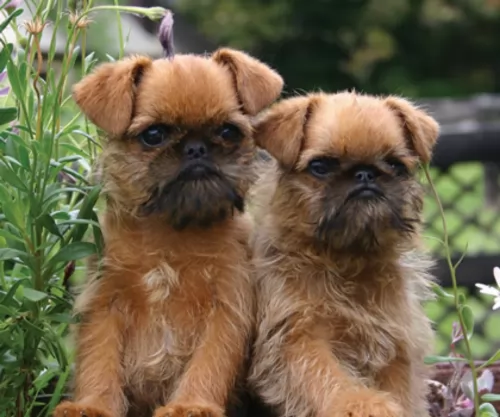 When you get your Griffon from a reputable breeder, you always have a better chance that he’ll be healthy. As it is, the Belgian Griffon has few hereditary health issues. However his dark eyes will have some genetic problems to contend with and he could suffer with progressive retinal atrophy. This is an illness which can lead to blindness
When you get your Griffon from a reputable breeder, you always have a better chance that he’ll be healthy. As it is, the Belgian Griffon has few hereditary health issues. However his dark eyes will have some genetic problems to contend with and he could suffer with progressive retinal atrophy. This is an illness which can lead to blindness
Syringomyelia – this is a neurological condition – an abnormality of the spinal cord – a disease which occurs more frequently in small breeds. It can cause your pet to endure a lot of pain.
Birthing Issues - these little dogs often have problems with giving birth, and a vet often has to intervene and perform a cesarean.
 The Broholmer faces many of the same health issues as other large breeds, even though he is overall a very healthy breed. Some of the types of health issues the Broholmer might deal with include:
The Broholmer faces many of the same health issues as other large breeds, even though he is overall a very healthy breed. Some of the types of health issues the Broholmer might deal with include:
Bloat – caused by eating a large meal too quickly and drinking a lot of water or exercising too soon before or after the large meal.
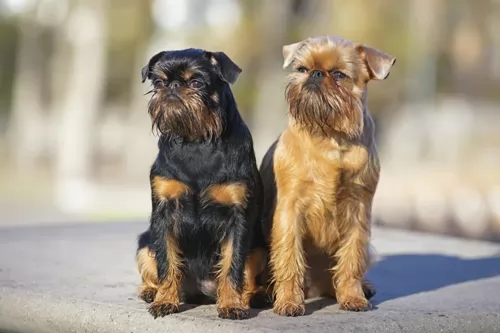 The Belgian Griffon will do well if you invest in high quality foods. You can make your own, but if you’re concerned about his health, it would be best to check what ingredients should go into his home-prepared meals to ensure he gets all the vitamins and minerals he needs.
The Belgian Griffon will do well if you invest in high quality foods. You can make your own, but if you’re concerned about his health, it would be best to check what ingredients should go into his home-prepared meals to ensure he gets all the vitamins and minerals he needs.
If you want to go with commercially manufactured dog foods, check with your vet about wet- and dry foods. Your vet will help with choosing a food appropriate to his size and age. Always ensure that there is clean, fresh water available to your pet.
Even though he is a small breed, he is fairly active and he will need his fair share of exercise like ball games and walks. Training and socialization are a must for him. You’ll notice that training isn’t particularly easy with this breed, and first time dog owners might not have the patience with him.
 Don’t overfeed the Broholmer. Give her about three and three quarters to nine cups of a high quality dry food. Depending on the size of your dog, adjust the amount of food within the guidelines listed here. Feed at least twice a day. Use a large breed dog food.
Don’t overfeed the Broholmer. Give her about three and three quarters to nine cups of a high quality dry food. Depending on the size of your dog, adjust the amount of food within the guidelines listed here. Feed at least twice a day. Use a large breed dog food.
Bloat – when the stomach is twisted and distended. This can cause death is not responded to by a vet immediately.
Eye Issues – Entropion turning inward of eyelids and irritating eye; Ectropium eyelids turn outward, Cataracts and Progressive Retinal Atrophy (PRA) -genetic defects of the retina can cause blindness.
The Broholmer is not an overly active dog but he is big and athletic so has strong exercise needs. A large fenced in back yard is essential or be prepared for several long walks every day. You can play inside games like teaching new tricks or hide and seek but remember this is a big dog. He would love to swim, play frisbee or ball, go hiking or organized activities such as fly ball, agility, rally and obedience. Don’t let your Broholmer over exercise while it is young and still growing. He needs as much mental stimulation as physical exercise.